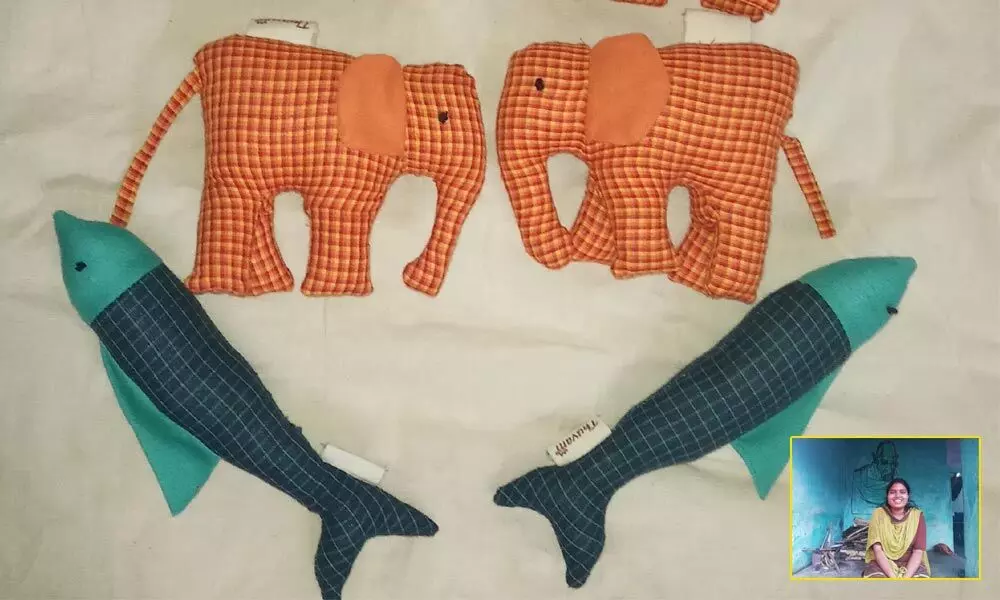Live
- Demand to set up separate ITDA for Srikakulam dist
- Drone manufacture unit inaugurated at CU
- VUPPC opposes VRS scheme
- Temple land worth `50 cr taken over by Simhachalam
- The Connection between Sleep and Women’s Health
- Youth Should Take Inspiration from Swami Vivekananda - MLA Dr. Rajesh Reddy
- Women’s Hearts Matter: Understanding the Risk and Preventing Heart Disease
- Sankranti Brahmotsavam begins at Srisailam
- Strict action against cockfights, illegal activities, SP warns
- Chittoor SP gets addl charge of Tirupati district
Just In

By women, for the women
Thuvam is an initiative to eradicate the rural migration by tailor clothes right in the middle of the village. They focus on sustainable clothing possibilities in lingerie’s and much more sustainable products which we feel is the need of the hour
Thuvam is run by run by three women including its founder Ponmani, was backed by a strong resolve to prevent women from migrating from the region.
In March 2017, SP Ponmani, a fashion design graduate from Madurai, then 24 years old, visited Cuckoo Forest School near Puliyanur village in Krishnagiri district to attend an event hosted by Nurpu, a handloom weaving society founded by C Sivagurunathan.
Ponmani shares, "Being at the cuckoo forest school for some time and I get to know the lives of the rural women in the nearby village puliyanur. Due to their financial needs, a lot of women are migrating to metro cities in search of jobs, leaving their kids behind. I wanted to do something which would help the children to grow up with their mothers. That was the moment idea of starting the tailoring classes evolved. In 2017, tailoring classes were started by renting a small room in the puliyanur village. Initially the turnout was very poor and irregular. Gradually 2-3 women were coming for the tailoring classes regularly."
After a year or so of the tailoring classes, around 4 women were able to learn learned stitch cloth for their own family needs.
She adds, "If they get a decent income regularly by doing tailoring in their free time at home they won't be going for jobs to the cities. That is when the idea about designing a product came to my mind. "We shall be able to fulfill our basic needs from the skills we have learnt" So we decided to launch a brand named "Thuvam", a Tamil word which means "the path". This is our first humble initiative in creating a 'new path' in cloth products."
According to Ponmani, people in the village didn't believe that she was giving them free tailoring course. Later few of the women came forward to join the classes that were conducted. After the basic classes like machine handling, basic sewing and small pattern goods, the ladies believe and continue the classes. After that they started to make lingerie's and sell them via online sites and their website www.thuvam.in to provide rural empowerment.
Sharing about how 'Thuvam' is different from the other brands in the market, she shares, "After making them, we gave it to our friends used these products and from their suggestions and corrections, we shaped it into the perfect form for customer use. The product is made by woven fabric. Basically, a cotton garment is bleached, dyed and then printed. Even if you don't include these three steps, growing cotton, making the cloth and stitching it into a garment uses anywhere between 100 to 150 litres of water. Thuvam simply eliminates these steps, conserves water and makes them safe for your skin. One of our designs uses elastic simply because women are more used to it than the string that Thuvam prefers. Knitted fabric requires heavy machinery. That's not the case with hand-woven fabric. Moreover, most of the stitching for woven fabric can be done on simple sewing machines."
Along with Ponmani, there are two other women Mumtaz and Pradeepa working along with her, who earn nearly Rs 250 per day for piece count.
Toys refashioned from scrap
According to her, whenever she saw an object, there was always a question raised in her mind, what if it is made by cloth or how to sew a safe cover for that object.
Ponmani adds, "I learned toy-making as part of my curriculum. I gradually taught women from my unit too and soon. Initially, i stuffed the dolls with strips of cloth from old T-shirts and kurtas. I also tried stuffing the dolls with ilavan panju (silk cotton), but they did not retain the shape a few days on, so now we uses polyester stuffing. I feel cloth toys are better than their plastic counterparts. They do not harm the environment and can be washed, and re-purposed after their lifetime. There is no risk of choking and mothers can safely offer such toys to their children. Right now in the Thuvam cloth dolls range, we designed elephants and fishes both palm-sized. I think these dolls have added more color to our lives, literally. The underwear we make is off-white in color, since they are unbleached and for a change, our women are working with colored fabric."

© 2025 Hyderabad Media House Limited/The Hans India. All rights reserved. Powered by hocalwire.com







